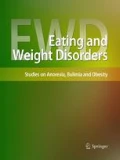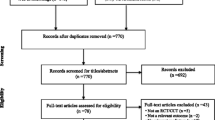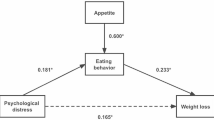Abstract
Purpose
This study aims at identifying behavioural and psychological pretreatment predictors of 12- and 36-month weight loss in women with overweight/obesity enrolled in a behavioural weight management intervention.
Methods
A sample of 221 women participated in a randomized controlled trial on weight management (n12 month = 184; n36 month = 156). Multiple linear regressions were used to identify pretreatment predictors of successful weight loss, separately for intervention and control groups. Completers-only and baseline observation carried forward analyses were performed. This study is a secondary analysis of data from the ‘Promotion of Exercise and Health in Obesity’ randomized controlled trial.
Results
Fewer weight loss attempts in the last year positively predicted weight loss at 12 months in the intervention group, explaining 6% of the variance. At 36 months, in the intervention group, 20.2% of the variance in weight change was explained by lower eating disinhibition and higher weight-related quality of life in completers-only analyses, while baseline observation carried forward analyses explained only 9.8% of the variance in weight change via higher self-esteem and lower weight loss expectations. In the control group, higher exercise self-efficacy and a more internal weight locus of control predicted weight loss at 36 months, explaining 13.9% of the variance (completers-only analyses).
Conclusions
Previous weight loss attempts were identified as the most efficient pretreatment predictor of 12-month weight loss. Eating disinhibition, weight-related quality of life, self-esteem, weight loss expectations, exercise self-efficacy, and weight locus of control seem to be key factors for long-term success.
Level of evidence
Level I, randomized controlled trial.
Clinical trial registration
ClinicalTrials.gov identifier NCT00513084.
Similar content being viewed by others
Data availability
The data sets generated during the current study are available from the corresponding author on reasonable request.
References
Kopelman P (2007) Health risks associated with overweight and obesity. Obes Rev 8:13–17. https://doi.org/10.1111/j.1467-789X.2007.00311.x
Santos I, Sniehotta FF, Marques MM, Carraça EV, Teixeira PJ (2017) Prevalence of personal weight control attempts in adults: a systematic review and meta-analysis. Obes Rev 18:32–50. https://doi.org/10.1111/obr.12466
MacLean PS, Wing RR, Davidson T, Epstein L, Goodpaster B, Hall KD et al (2015) NIH working group report: innovative research to improve maintenance of weight loss. Obesity 23:7–15. https://doi.org/10.1002/oby.20967
Carraça EV, Santos I, Mata J, Teixeira PJ (2018) Psychosocial pretreatment predictors of weight control: a systematic review update. Obes Facts 11:67–82. https://doi.org/10.1159/000485838
Elfhag K, Rossner S (2005) Who succeeds in maintaining weight loss? A conceptual review of factors associated with weight loss maintenance of weight loss. Obes Rev 6:67–85. https://doi.org/10.1111/j.1467-789X.2005.00170.x
Varkevisser RD, van Stralen MM, Kroeze W, Ket JC, Steenhuis IH (2019) Determinants of weight loss maintenance: a systematic review. Obes Rev 20:171–211. https://doi.org/10.1111/obr.12772
Dalle Grave R, Calugi S, El Ghoch M (2018) Are personality characteristics as measured by the Temperament and Character Inventory (TCI) associated with obesity treatment outcomes? A systematic review. Curr Obes Rep 7:27–36. https://doi.org/10.1007/s13679-018-0294-y
Silva MN, Vieira NV, Coutinho SR, Minderico CS, Matos MG, Sardinha LB et al (2010) Using self-determination theory to promote physical activity and weight control: a randomized controlled trial in women. J Behav Med 33:110–122. https://doi.org/10.1007/s10865-009-9239-y
Ryan RM, Deci EL (2017) Self-Determination Theory: Basic Psychological Needs in Motivation, Development, and Wellness, 1st edn. Guilford Press, New York
Silva MN, Teixeira PJ, Vieira PN, Minderico CS, Castro M, Coutinho S et al (2007) Programa P.E.S.O—Promoção do Exercício e Saúde na Obesidade: Metodologia e descrição da intervenção. ENDO—Endocrinologia. Diabetes Obes 16:17–28
Machado P, Gonçalves S, Martins C, Soares I (2001) The Portuguese version of the eating disorders inventory: evaluation of its psychometric properties. Eur Eat Disord Rev 9:43–52. https://doi.org/10.1002/erv.359
Viana V, Sinde S (2003) Estilo Alimentar: adaptação e validação do questionário holandês do comportamento alimentar. Psicologia Teoria Investigação e Prática 8:59–71
van Strien T, Frjiters E, Bergers P, Defares P (1986) The Dutch eating behavior questionnaire (DEBQ) for assessment of restrained, emotional, and external eating behavior. Int J Eat Disord 5:295–315
Stunkard AJ, Messick S (1985) The three-factor eating questionnaire to measure dietary restraint, disinhibition and hunger. J Psychosom Res 29:71–83
Westenhoefer J, Stunkard AJ, Pudel V (1999) Validation of the flexible and rigid control dimensions of dietary restraint. Int J Eat Disord 26:53–64
McAuley E, Duncan T, Tammen VV (1989) Psychometric properties of the Intrinsic Motivation Inventory in a competitive sport setting: a confirmatory factor analysis. Res Q Exerc Sport 60:48–58
Sousa H, Rosa J (2002) Validação preliminar da escala de auto-eficácia para o exercício. Psicologia do Desporto e Atividades Físicas ULHT, Lisbon
Sallis JF, Pinski MA, Grossman RB, Patterson TL, Nader PR (1988) The development of self-efficacy scales for health-related diet exercise behaviors. Health Educ Res 3:283–292
Steinhardt MA, Dishman RH (1989) Reliability and validity of expected outcomes and barriers for habitual physical activity. J Occup Med 31:536–546
Silva MN, Vieira PN, Minderico CS, Castro MM, Coutinho SR, Santos TC, Teixeira PJ (2007) Testing a Portuguese self-determination theory-based psychometric battery. In: International society for behavioral nutrition and physical activity annual meeting, Oslo, Norway
Sheldon G, Williams G, Joiner T (2003) Self-Determination Theory on the clinic: Motivation physical and mental health. Yale University Press, New Haven
Rosen JC, Jones A, Ramirez E, Waxman S (1996) Body shape questionnaire: studies of validity and reliability. Int J Eat Disord 20:315–319
Hart EA, Leary MR, Rejeski WJ (1989) The measurement of social physique anxiety. J Sport Exerc Psychol 11:94–104
Cunha JA (2001) Manual da versão em português das escalas de Beck. Psychological Corporation, São Paulo
Beck A, Steer R, Brown K (1996) Manual for the beck depression inventory-II. Psychological Corporation, San Antonio
Antunes P, Palmeira A (2003) Motivation for physical education classes: its relations with physical self-perceptions and body mass index. In: XI conference of the European federation of sport psychology, Copenhagen, Denmark
Rosenberg M (1965) Society and the adolescent self-image. Princeton University Press, Princeton
Engel SG, Kolotkin RL, Teixeira PJ, Sardinha LB, Vieira PN, Crosby RD (2005) Psychometric and cross-national evaluation of a Portuguese version of the impact of weight on quality of life-lite (IWQOL-Lite) questionnaire. Eur Eat Disord Rev 13:133–143. https://doi.org/10.1002/erv.614
Kolotkin RL, Head S, Hamilton M, Tse CK (1995) Assessing impact of weight on quality of life. Obes Res 3:49–56
Stotland S, Zuroff DC (1990) A new measure of weight locus of control: the dieting beliefs scale. J Pers Assess 54:191–203
Field AP (2009) Discovering statistics using SPSS, 3rd edn. Sage Publications, London
Teixeira PJ, Palmeira AL, Branco TL, Martins SS, Minderico CS, Barata JT et al (2004) Who will lose weight? A reexamination of predictors of weight loss in women. Int J of Behav Nutr Phys Act 1:12. https://doi.org/10.1186/1479-5868-1-12
Cohen J, Cohen P, West S, Aiken L (2003) Applied multiple regression/correlation analysis for the behavioral sciences, 3rd edn. Lawrence Erlbaum Associates, Mahwah
Dalle Grave R, Melchionda N, Calugi S, Centis S, Tufano A, Fatati G et al (2005) Continuous care in treatment of obesity: an observational multicentre study. J Intern Med 258:265–273. https://doi.org/10.1111/j.1365-2796.2005.01524.x
Nir Z, Neumann L (1995) Relationship among self-esteem, internal-external locus of control, and weight change after participation in a weight reduction program. J Clin Psychol 51:482–490
Teixeira P, Going S, Sardinha L, Lohman T (2005) A review of psychosocial pre-treatment predictors of weight control. Obes Rev 6:43–65. https://doi.org/10.1111/j.1467-789X.2005.00166.x
Urbanek JK, Metzgar CJ, Hsiao PY, Piehowski KE, Nickols-Richardson SM (2015) Increase in cognitive eating restraint predicts weight loss and change in other anthropometric measurements in overweight/obese premenopausal women. Appetite 87:244–250. https://doi.org/10.1016/j.appet.2014.12.230
Silva MN, Markland D, Carraça EV, Vieira PN, Coutinho SR, Minderico CS et al (2011) Exercise autonomous motivation predicts 3-year weight loss in women. Med Sci Sports Exerc 43:728–737. https://doi.org/10.1249/MSS.0b013e3181f3818f
Sasdelli AS, Petroni ML, Paoli AD, Collini G, Calugi S, Dalle Grave R et al (2018) Expected benefits and motivation to weight loss in relation to treatment outcomes in group-based cognitive-behavior therapy of obesity. Eat Weight Disord 23:205–214. https://doi.org/10.1007/s40519-017-0475-9
Foright RM, Presby DM, Sherk VD, Kahn D, Checkley LA, Giles ED et al (2018) Is regular exercise an effective strategy for weight loss maintenance? Physiol Behav 188:86–93. https://doi.org/10.1016/j.physbeh.2018.01.025
Funding
This study was funded by grants from the Portuguese Science and Technology Foundation (FCT-POCI/DES/57705/2004) and the Calouste Gulbenkian Foundation (grant number 65565/2004). The authors are grateful to the Oeiras City Council and Nestlé Portugal for their additional financial support.
Author information
Authors and Affiliations
Contributions
Rui Jorge and Inês Santos made substantial contributions to the analysis, interpretation of data, and took the lead on drafting and revising the manuscript for important intellectual content; Rita Tomás, Marlene N. Silva, Eliana V. Carraça, Vitor H. Teixeira, and Pedro J. Teixeira were involved in revising the manuscript for important intellectual content. All authors approved the final version of the manuscript.
Corresponding author
Ethics declarations
Conflict of interest
On behalf of all authors, the corresponding author states that there is no conflict of interest.
Ethical approval
All procedures of this study were approved by the Institutional Review Board of the Faculty of Human Kinetics, Technical University of Lisbon and are in accordance with the 1964 Helsinki declaration and its later amendments.
Informed consent
Informed consent was obtained from all individual participants included in the study.
Additional information
Publisher's Note
Springer Nature remains neutral with regard to jurisdictional claims in published maps and institutional affiliations.
Electronic supplementary material
Below is the link to the electronic supplementary material.
Rights and permissions
About this article
Cite this article
Jorge, R., Santos, I., Tomás, R. et al. Behavioural and psychological pretreatment predictors of short- and long-term weight loss among women with overweight and obesity. Eat Weight Disord 25, 1377–1385 (2020). https://doi.org/10.1007/s40519-019-00775-9
Received:
Accepted:
Published:
Issue Date:
DOI: https://doi.org/10.1007/s40519-019-00775-9




